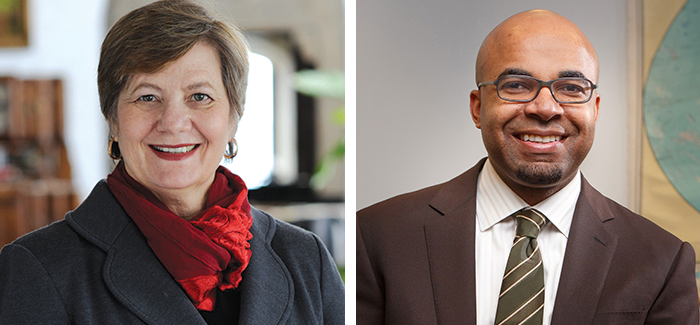
Roth began teaching at the University in 1980; Small joined the UChicago faculty in 2006. (Photography by Jason Smith)
Humanities dean Martha Roth and social sciences dean Mario Luis Small discuss the Neubauer Collegium for Culture and Society, “a laboratory for humanists.”
In 2012 the Divisions of Humanities and Social Sciences established the Neubauer Collegium for Culture and Society, an innovative model for interdisciplinary research setting a new standard in the academy. Certainly scholarship that extends past disciplinary boundaries is not new to the University of Chicago: our institution is renowned for its variety of research centers and cross-disciplinary discussions among our faculty. But the Neubauer Collegium does more than just add to the conversation on campus. It reshapes how we approach, encourage, and support interdisciplinary work, offering the space, resources, and global institutional reach that can help faculty turn their most ambitious ideas and aspirations into sustained collaboration. We see the Neubauer Collegium as a laboratory for the humanities and humanistic social sciences—a gathering space where scholars from around the world can join with UChicago faculty to learn from one another and experiment collaboratively with new methods and ideas to address complex questions beyond the scope of any discipline.
Under the leadership of David Nirenberg, the Deborah R. and Edgar D. Jannotta professor of medieval history and social thought, the first year of the collegium has been a remarkable success. With the support of a founding $26.5 million gift from Joseph Neubauer, MBA’65, and Jeanette Lerman-Neubauer, and the selection of 5701 South Woodlawn as its future home, the Neubauer Collegium is poised to become a major intellectual and physical destination on campus. In October 2013 we were pleased to announce a major gift from Emmanuel Roman, MBA’87, to support a named directorship for the collegium. That same month, hundreds of campus and community members packed Mandel Hall for a public lecture delivered by internationally renowned artist William Kentridge, marking the official launch of the Neubauer Collegium.
The first cohort of faculty research projects—the centerpiece of the collegium’s work on campus—engages widely with big questions and broad topics. A group of classicists, archaeologists, and economists are using comparative economics, from ancient societies to the present, to create new forms of analysis and debate. This group is also interested in using new ways to collaborate and publish by hosting a series of public workshops and publishing their results in an electronic format for easier access. Another research team focuses on a different audience: teenagers. Crossing the fields of literature, technology, and public health, the Game Changer Chicago Design Lab works with game designers and adolescents from neighboring communities to cocreate digital and nondigital games that positively impact social learning and health choices. And a group of faculty from linguistics, human development, and psychology are examining how physical actions, gestures, and sign language shape learning and creativity. In all, the Neubauer Collegium sponsored 18 collaborative projects in its first operational year, each offering new directions for continued research.
The 2014–15 cohort of Neubauer Collegium faculty research projects will continue the success of our first year, exploring topics from migration and material culture to humanism and the classics. Where else but in the collaborative structure of the Neubauer Collegium can one find anthropologists working together with scholars from economics, law, and business on the problems of health insurance in India? Where else could an interdisciplinary research team boldly aim to create a new Chicago school on the state, violence, and social control? And how would scholars from medicine, classics, and comparative literature investigate issues of end-of-life care if not for the Neubauer Collegium’s support? The 11 research projects funded for the coming year display an exceptionally curious faculty, and the topics they cover demonstrate the Neubauer Collegium’s flexibility to accommodate scholars and methodologies from disciplines across campus.
There is no better home for the Neubauer Collegium for Culture and Society than the University of Chicago, and there is no university better suited to accommodate the Neubauer Collegium’s goals of experimentation on complex questions and interdisciplinary innovation. This campus-wide venture pushes the limits of inquiry beyond disciplinary boundaries and methodologies and in doing so places the University of Chicago at the forefront of humanistic research.
